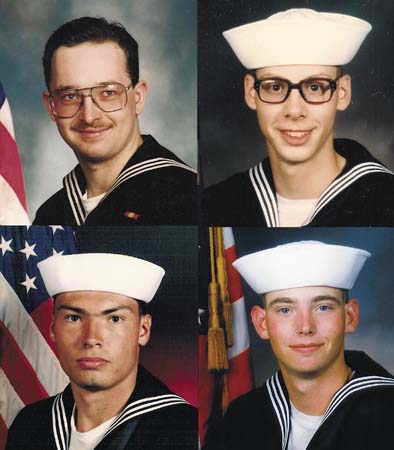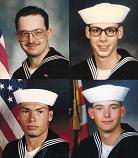What happens when someone confesses to a crime? A man confesses to a crime because he did it, right? The confessions of the "Norfolk four" in Virginia show that everything we assume about confessions has to be questioned, and reaching the truth in our criminal justice system can be very elusive.
On July 7, 1997, Michelle Moore-Bosko is raped and murdered in her apartment. The first suspect in this crime quickly becomes apartment neighbor and Navy sailor Daniel Williams. Williams is brought in by the police for what he believes will be routine questioning, but the questioning really is an interrogation whose sole purpose is to extract a confession from Williams. Williams denies having committed the crime over and over, but never asks for a lawyer to be present. Williams is given a polygraph test which he passes, but the detectives tell him he failed. Detectives Maureen Evans and Robert Glen Ford interrogate Williams in a small room, berating him constantly that they know the truth and they can help him if he confesses. Finally after 11 hours he confesses that he committed the crime.
The story then spirals out of control because the confession Williams gave does not match the physical evidence. Williams' DNA does not match the evidence at the crime scene so there must be another attacker. On January 12, 1998 police arrest another Navy sailor Joe Dick and Detective Ford interrogates Dick until he confesses. Still there is no DNA match with Dick and two more sailors are implicated -- Eric Wilson and Derek Tice, each who confess after hours of interrogation from Ford. The confession stories vary wildly and still none of the 4 have DNA that match the sample found at the crime scene. 3 other men are implicated in the crime, however the 3 do not confess. Still there is no DNA match.
This is Derek Tice recounting the interrogation by Robert Glenn Ford.
Ford, he postured like a bulldog. He leaned towards me, calling me a liar, telling me I was going to die. And this went on for 8 hours. I keep telling him I didn't know anything about the crime. I wasn't there, but he had in his mind what he thought was the truth. Until I said what he wanted me to say, I wasn't getting out of that room.
A year later on March 4, 1999 convicted criminal Omar Ballard confesses to the rape and murder of Michelle Moore-Bosko. He confesses after 20 minutes of questioning. He claims to have acted alone, and later it is found that his DNA DOES MATCH the sample found at the crime scene.
At this point you might say we know the truth so why continue prosecuting the four sailors who confessed. It's obvious to anyone that the confessions were coerced and the four had nothing to do with the crime. But no, somehow prosecutors are able to concoct the story that the four sailors met Ballard in the parking lot and he joined them in the crime. Ballard's claim that he acted alone is considered unreliable, and prosecution of the four sailors marches on until each is convicted. Though the stories vary and there's no physical evidence, the confessions each gave become the main piece of evidence that convicts each of the men.
Years later in 2004 after the four men have been in prison 3 major Washington, DC law firms get involved in the cases as pro bono advocates for the men. However, undoing the wrongful convictions is a painfully slow process. The lawyers hired sociologist Richard Ofshe who concluded:
All of the evidence I have reviewed and all of my years of study of interrogations and false confession leads me to conclude that Danial Williams, Joseph Dick and Derek Tice are innocent beyond any reasonable doubt.
Other experts are brought in and come to the same conclusion that there could only be one perpetrator, Omar Ballard. Finally, appeals through the legal system and appeals to the governor of Virginia succeeded in freeing all of the Norfolk four from prison. However each are not cleared of their convictions and have to register as sex offenders. Their lives are still not their own. The confessions to a crime they did not commit follow them every day.
In the aftermath, Derek Tice was exonerated in 2011 but the other 3 men's cases are still under appeal. Robert Glenn Ford was convicted of extortion and lying to the FBI and is now in jail, though his crime is unrelated to the Norfolk Four.
Coerced confessions continue to be used by law enforcement over and over. Even when it's clear the confessions are not true the legal system weighs these confessions over any other evidence. The same dynamic occurred in the case of the Central Park Five, only in this case the confessions were finally thrown out. In another case made famous by the documentary "Making a Murderer" the confession of 16 year old Brendan Dassey was used to send him to prison for a crime he apparently had nothing to do with. Law enforcement will claim that it needs to use aggressive tactics to get the truth from suspects, but it clearly goes over the line when the evidence no longer lines up with the confessions.







